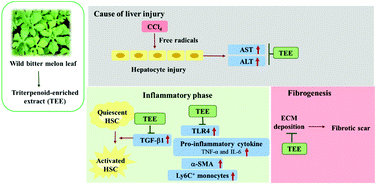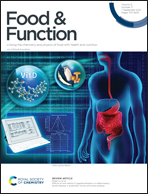A triterpenoid-enriched extract of bitter melon leaves alleviates hepatic fibrosis by inhibiting inflammatory responses in carbon tetrachloride-treated mice†
Abstract
Liver fibrosis is a progression of chronic liver disease characterized by excess deposition of fibrillary collagen. The aim of this study was to investigate the protective effect of a triterpenoid-enriched extract (TEE) from bitter melon leaves against carbon tetrachloride (CCl4)-induced hepatic fibrosis in mice. Male ICR mice received TEE (100 or 150 mg kg−1) by daily oral gavage for one week before starting CCl4 administration and throughout the entire experimental period. After intraperitoneal injection of CCl4 for nine weeks, serum and liver tissues of the mice were collected for biochemical, histopathological and molecular analyses. Our results showed that TEE supplementation reduced CCl4-induced serum aspartate aminotransferase and alanine aminotransferase activities. Histopathological examinations revealed that CCl4 administration results in hepatic fibrosis, while TEE supplementation significantly suppressed hepatic necroinflammation and collagen deposition. In addition, TEE supplementation decreased α-smooth muscle actin (α-SMA)-positive staining and protein levels of α-SMA and transforming growth factor-β1. TEE-supplemented mice had lower mRNA expression levels of interleukin-6, tumor necrosis factor-α, and toll-like receptor 4. Moreover, TEE (150 mg kg−1) supplementation significantly reduced intrahepatic inflammatory Ly6C+ monocyte infiltration. We demonstrated that TEE could ameliorate hepatic fibrosis by regulating inflammatory cytokine secretion and α-SMA expression in the liver to reduce collagen accumulation.



 Please wait while we load your content...
Please wait while we load your content...